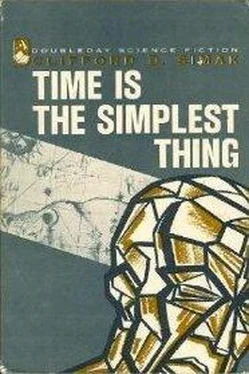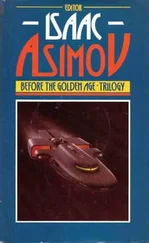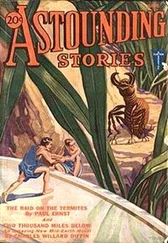The canoe bucked wildly, spinning, and Blaine in an instant lost all sense of direction. In the ticking of a single second he was lost upon the river, with not the least idea of where the shore might lie. He lifted the paddle and laid it across the thwarts, hanging tightly, trying to keep the craft trim as it tossed and yawed.
The wind had a sharpness and a chill it had not had before and it struck his sweaty body like an icy knife. The snow clotted on his eyebrows, and streams of water came trickling down his face as it lodged in his hair and melted.
The canoe danced wildly, running with the waves, and Blaine hung grimly on, lost, not knowing what to do, overwhelmed by this assault that came roaring down the river.
Suddenly a snow-shrouded clump of willows loomed out of the grayness just ahead of him, not more than twenty feet away, and the canoe was bearing straight toward it.
Blaine only had time to get set for the crash, crouched above the seat, legs flexed, hands gripping the rails.
The canoe tore into the willows with a screeching sound that was muffled by the wind and caught up and hurled away. The craft hit and drove on into the willow screen, then hung up and slowly tipped, spilling Blaine out into the water.
Struggling blindly, coughing and sputtering, he gained his feet on the soft and slippery bottom, hanging tight to the willows to keep himself erect.
The canoe, he saw, was useless. A hidden snag had caught its bottom and had ripped a long and jagged tear across the canvas. It was filling with water and slowly going down.
Slipping, half-falling, Blaine fought his way through the willow screen to solid ground. And it was not until he left the water that he realized the water had been warm. The wind, striking through the wetness of his clothes, was like a million icy needles.
Blaine stood shivering, staring at the tangled clump of willows that thrashed wildly in the gale.
He must find a protected spot, he knew. He must start a fire. Otherwise, he’d not last out the night. He brought his wrist close up before his face, and the watch said that it was only four o’clock.
He had, perhaps, another hour of light and in that hour he must find some shelter from the storm and cold.
He staggered off, following the shore — and suddenly it struck him that he could not start a fire. For he had no matches, or he didn’t think he had, and even if he did they would be soaked and useless. Although, more than likely, he could dry them, so he stopped to look. He searched frantically through all his sopping pockets. And he had no matches.
He plunged on. If he could find snug shelter, he might be able to survive even with no fire. A hole beneath the roots of a tipped-over tree, perhaps, or a hollow tree into which he could squeeze himself — any confined space where he’d be sheltered from the wind, where his body’s heat might have a chance to partially dry out his clothing and be held in to warm him.
There were no trees. There was nothing but the everlasting willows, whipping like demented things in the gusty wind.
He stumbled on, slipping and falling, tripping over unseen chunks of driftwood left stranded by high water. He was covered with mud from his many falls, his clothes were freezing stiff, and still he blundered on. He had to keep on moving; he must find a place in which to hide; if he stood still, if he failed to move, he would freeze to death.
He stumbled again and pulled himself to his knees and there, at the water’s edge, jammed in among the willows, floated a swamped canoe, rocking heavily in the storm-driven wash of water.
A canoe!
He wiped his face with a muddy hand to try to clear his vision.
It was the same canoe, for there would be no other!
It was the canoe he’d left to beat his way along the shore.
And here he was, back at it again!
He fought with his muddled brain to find an answer — and there was an answer, the only answer that was possible.
He was trapped on a tiny willow island!
There was nothing here but willows. There were no honest trees, tipped-over, hollow, or in any other wise. He had no matches, and even if he had, there was no fuel except the scattered driftwood and not too much of that.
His trousers were like boards, frozen stiff and crackling as he bent his knees. Every minute, it seemed to him, the temperature was dropping — although there was no way to know; he was too cold to tell.
He came slowly to his feet and stood straight, faced into the cutting wind, with the hiss of snow driving through the willows, with the angry growl of the storm-lashed river and the falling dark, and there was another answer to a question yet unasked.
He could not live the night on this island and there was no way to leave it. It might be, for all he knew, no more than a hundred feet from shore, but even if it were, what difference would it make? Ten to one he’d be little better off on shore than he was right here.
There had to be a way, he insisted to himself. He could not die on this stinking little dot of real estate, this crummy little island. Not that his life was worth so much — perhaps not even to himself. But he was the one man who could get to Pierre for help.
And that was a laugh. For he’d never get to Pierre. He’d not get off the island. In the end, he’d simply stay right where he was and it was more than likely that he’d not be found.
When the spring floods came, he’d go down the river with all the other debris that the stream would collect and carry in its raging torrent.
He turned and went back a ways from the water’s edge. He found a place where he was partially shielded from the wind by the thickness of the willows and deliberately sat down, with his legs stuck out straight before him. He turned up the collar of his jacket and it was a gesture only, for it did no good. He folded his arms tight across his chest and pinched half-frozen hands into the feeble warmth of armpits and stared straight ahead into the ghostly twilight.
This was wrong, he knew. When a man got caught in a fix like this, he kept on the move. He kept the blood flowing in his veins. He fought off sleep. He beat and flailed his arms. He stamped his feet. He fought to keep alive.
But it was no use, he thought. A man could go through all the misery of the fight and still die in the end.
There must be another way, a better way than that.
A real smart man would think of a better way than that.
The problem, he told himself, trying to divorce himself from the situation for the sake of objectivity — the problem was to get himself, his body, off this island and not only off this island, but to a place of safety.
But there was no place of safety.
Although suddenly there was.
There was a place that he could go. He could go back to that bright-blue living room where the Pinkness dwelled.
But no! That would be no better than staying on the island, for if he went he’d only go in mind and leave his body here. When he returned, the body, more than likely, would be unfit for use.
If he could take his body there, it would be all right.
But he couldn’t take his body.
And even if he could, it might be very wrong and very likely deadly.
He tried to recall the data on that distant planet and it had escaped him. So he went digging after it and hauled it up from the deep recesses where he had buried it and regarded it with horror.
He’d not live a minute if he went there in his body!
It was pure and simple poison for his kind of life.
But there must be other places. There would be other places if only he could go there — if all of him could go there.
He sat hunched against the cold and wet and didn’t even feel the cold and wet.
He sought the Pinkness in him and he called it and there was no answer.
Читать дальше








